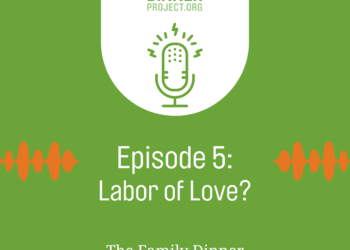[ad_1]

Elevated household bonding is without doubt one of the mostly mentioned benefits of family meals. However when households embody members with autism, ADHD, or other learning and developmental differences, growing these bonds on the desk might be difficult. Caregivers and siblings would possibly have to work on discovering new methods to adapt their communication kinds or expectations so that everybody feels snug, linked, and included.
“We all know that meals and consuming are imagined to be social,” says Naureen Hunani, RD., a pediatric and household dietitian who focuses on neurodiversity. “The social perform is one thing that folks are involved about.” However that concern for a kid’s social interplay abilities, mixed with a way that household mealtimes are supposed to boost relationships and communication, can generally add pointless stress. Mother and father might really feel that they’ve to make use of interactions on the dinner desk as a chance to “work on” social abilities objectives for his or her baby, which might make the household meal really feel extra like a medical setting than a spot to loosen up.
“All of it comes right down to objectives,” says Bob Cunningham, Government Director of Studying Improvement for Understood. “Time for supper doesn’t need to be observe time.” He provides that for fogeys who’re already stretched skinny, “overprogramming” household time with social interventions might be exhausting. “Mother and father get bored with scheduling every thing round their children’ lives,” he factors out. “There’s not sufficient on the market about non-goal-oriented time.”
Nonetheless, making a low-pressure setting for household meals and resisting the urge to make dinnertime overly therapeutic is simpler mentioned than executed. And even for fogeys with the very best of intentions, widespread challenges with dialog, turn-taking, interrupting, and social cues could cause frustration – or a breakdown of sibling relationships. We requested Hunani, Cunningham, and a bunch of different consultants to reply some real-life questions from households about making household meals inclusive.

My baby has hassle leaping into fast-moving conversations on the desk. What ought to we do?
Dr. Martha Straus, psychologist, professor, and creator of Cool, Calm, and Related, solutions this query bluntly: “Why are you having fast-moving conversations with a baby who struggles with this? Quick-moving, loud conversations might be overwhelming. It’s so much simpler for fogeys to speak like their baby, than vice-versa.”
Dr. Nora Friedman, Clinician on the Lurie Center at MGH, agrees. “Decelerate the dialog.” She additionally factors out that the dinner desk is usually a noisy setting, which can be distracting and contribute to conversational points for a kid with slower processing pace or sensory challenges. Friedman recommends minimizing background noise, and probably selecting one or two dialog matters upfront. “Give the kid a heads-up: ‘We’re going to speak about this information merchandise or what you probably did in school at this time’ so the kid can put together for the dialog and never really feel caught off-guard.”
Making ready upfront for matters, and determining a delicate system for altering topics, are additionally on Cunningham’s listing of suggestions. “The youngsters who’ve the toughest time with siblings are those with sluggish processing,” he says. “If the tempo of the dialog isn’t consistent with the siblings’ tempo, that’s actually an issue. Dinner dialog doesn’t normally adhere to the structured dialog of different settings (like college). If there’s a theme in place, then children can work out what’s taking place.”
He factors out that any small quantity of predictability in dinner dialog can construct confidence and success. Households would possibly begin every meal with an exercise like Rose, Thorn, and Bud to assist children simply anticipate what the dialogue can be like from night time to nighttime. However, Cunningham notes, “You’ll be able to nonetheless have a household construction that permits everybody to speak about what they need. Ensure that every particular person says that they’re going to vary the topic, or have them introduce the brand new topic after which pause. Mother and father also can impose a break by saying ‘Take a second and assume when you go me the salt.’”
Mother and father also can assist facilitate a much less structured dialog by including some verbal cues and assist. Jennifer Stornelli, Pediatric Occupational Therapist and head of the Pediatric Feeding Program at Spaulding Outpatient Center for Children in Lexington, encourages grownup caregivers to seek out pure pauses within the dialog. “Summarize to your baby what you’re speaking about and ask them a easy associated query, giving further time for his or her response,” she advises. “And every time doable, maintain the mealtime conversations at a tempo that matches your baby, and maintain the content material relatable to all the current relations.” For instance, a guardian would possibly say “Sam, I used to be simply listening to what your brother mentioned about his expertise along with his trainer at this time. It sounded to me like he felt what the trainer did was unfair. Have you ever ever felt that manner about considered one of your academics?” If one other member of the family tries to vary the topic or interrupt earlier than Sam is ready to reply, the guardian would possibly say “Maintain on – I believe Sam’s nonetheless fascinated by what he desires to say. Let’s all take pleasure in just a few bites of our meals whereas he’s on the brink of share.”

My husband and considered one of my children are very talkative, however one other baby, who’s on the autism spectrum, has hassle with conversational turn-taking. Sadly once we’re at dinner collectively, the opposite relations get absorbed of their dialog and don’t bear in mind to create space for him to hitch in, or they get aggravated when he contributes by speaking about his particular pursuits. He wants the observe in dialog abilities – what ought to we do?
“His speaking about dinosaurs isn’t going to harm anybody,” Cunningham factors out, reminding mother and father once more that dinner doesn’t need to be the time to work on dialog abilities for a kid on the spectrum. “Maybe that setting isn’t observe time. This isn’t a baby who is able to take part easily in random dialog, so give him an opportunity to speak.” However, he cautions, letting the kid discuss his particular curiosity doesn’t imply that everybody simply waits for him to complete a monologue, then goes again to their very own discussions. “Simply giving the kid a flip isn’t actually going to assist. Have everybody take part in somewhat dialog about dinosaurs, and make room for that. It’s only a trade-off. It’s extra on the household to accommodate.”
“What’s making it so onerous to present house and time to the opposite baby?” Friedman asks, recommending that the household begin by asking themselves that query to see if it sparks any concepts or understanding about how the others would possibly adapt. She additionally agrees with Cunningham that the kid’s want to speak a few particular curiosity must be honored, however she presents a compromise that may assist with the mother and father’ want to work on conversational abilities. “We’ll set a timer so that you can discuss Pokemon for 5 minutes, then give everybody else an opportunity to speak about one thing particular from their day.” Friedman additionally notes that some children could be prepared to arrange two questions they’ll ask of their siblings at dinnertime, so after they’ve had their second to share a few particular curiosity, they’ll observe reciprocity by asking a query of another person on the desk.
Megan Mayo, MA, BCBA, LBA and doctoral candidate in medical psychology at Antioch College New England, provides that the entire household would possibly profit from engaged on conversational turn-taking. She suggests making an attempt some video games that reinforce turn-taking, like Roll the Orange. She additionally recommends having a immediate in place, like a cue card or a sign, that reminds the speaker to ask a query of another person on the desk. With whole-family video games and indicators in place, working towards turns into much less about one baby who “wants assist,” and extra about serving to everybody bear in mind to create space for one another within the dialog.

My baby is simply getting used to utilizing Assistive Technology/Augmentive and Alternative Communication (AAC) for communication. How can we assist the entire household study to be affected person with this new instrument and use it to permit everybody to be part of the dialog?
“I’m actually happy to listen to this query,” says Dr. Robyn Thom, Baby and Grownup Psychiatrist on the MGH Lurie Center for Autism. She shares that usually, as a result of households are capable of perceive the cues given by a baby with restricted verbal communication, AAC won’t be used as a lot in household settings. Thom provides, “I believe it’s actually essential for youths to make use of the system throughout all settings, so it’s essential for the kid to make use of it at residence so it turns into a main methodology of communication. However the baby could also be too drained to make use of it (at meals).” She encourages households to assume first about whether or not the kid and household are able to introduce AAC at dinner. “Is dinner the place to introduce it? Perhaps if there are a number of children, it might really feel like an excessive amount of. You would begin with utilizing it with only one guardian. Or you might get suggestions from the kid’s college on how they’re utilizing it, so you possibly can replicate that (at residence).”
Mayo additionally encourages mother and father to hunt professional assist in implementing AAC at mealtimes. “I’ve seen groups purchase the system for a household and easily count on it to repair all communication difficulties proper out of the field,” she says. She presents suggestions for serving to households use the units to encourage social interplay at dinner: “Begin with high-payoff interactions! Program in greetings and jokes, and program in requests for high-preference objects and actions,” she advises. “Additionally, ensure to have it programmed for two-way interactions, not simply requests.” To ease the inevitable awkwardness that may happen whereas the kid and household get used to utilizing AAC, Mayo recommends having one one who is fluent in utilizing the system – this could possibly be an outdoor professional, or a guardian who has been educated – sit with the kid and assist mannequin use of AAC. “And normalize awkwardness,” Mayo says. “It’s like utilizing a overseas language. It takes further time to course of communication, and it’ll take time to construct fluency!”
Stornelli advises ensuring that everybody within the household understands that studying curve. “Let different relations know that the kid might have further time to answer as he navigates the system, and that all of us wish to ensure he will get that point to speak his thought or thought,” she says. “Present alternatives for all of the relations to get some coaching utilizing the system, to allow them to assist him when he will get caught. You’ll be able to pull the Speech/Language Pathologist in for that assist.” She additionally agrees that pre-programming the system with dinner dialog in thoughts might be useful, recommending that households consider “issues which can be extra narrative in nature, like a blurb about what he did in school that day, if sharing about his day on the household meal is a typical a part of the routine.”
Melanie Potock, MA, CCC-SLP provides that simply as with every conversational turn-taking, establishing household indicators might be useful. “A tug in your earlobe or scratching the tip of your nostril to quietly point out it’s your baby’s flip to make use of their AAC and be part of the dialog offers everybody an opportunity to quietly pause and attend, with out creating frustration on the desk.”
Ultimately, selecting methods to handle conversational challenges when a baby has been recognized with ADHD, autism, or studying and developmental problems is as a lot about serving to the entire household adapt as it’s about serving to that baby talk. Anticipating neurotypical dialog patterns from a neurodivergent baby is sure to be irritating and upsetting for everybody. Introducing conversational routines like a each day set of questions, setting household expectations round turn-taking and persistence, and conserving issues enjoyable and low-pressure are keys to creating household meals inclusive. And bear in mind: Household dinner doesn’t need to be about remedy or social abilities objectives. It’s a time for everybody to indicate up and be snug being themselves.
[ad_2]
Source_link







